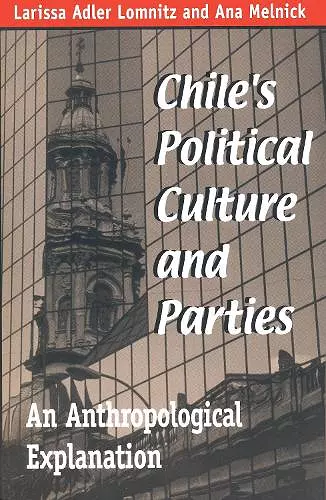Chile's Political Culture and Parties
An Anthropological Explanation
Larissa Adler Lomnitz author Ana Melnick author
Format:Paperback
Publisher:University of Notre Dame Press
Currently unavailable, and unfortunately no date known when it will be back
This paperback is available in another edition too:
- Hardback£86.00(9780268008406)

The concept of political culture is young—born from the need to explain the dramatic sociological and political changes that occurred in Europe both during and after the Second World War. The practice of examining the culture of political parties in depth through an ethnographic field study of a country’s social structure is, so far, a neglected one.
Larissa Adler Lomnitz and Ana Melnick rectify the lack of attention to this area with respect to Chile in Chile’s Political Culture and Parties: An Anthropological Explanation. This volume examines Chile’s political culture by considering its origin and the persistence of its “grammar,” which the authors define as the ability of each member of society to function within social categories and rules. This “grammar,” they believe, is what gives character to national culture.
Lomnitz and Melnick argue that political parties in Chile are a conglomeration of horizontal networks of friends. Class is perfectly established within Chile’s social tissue and is defined by a mixture of variables, including an individual’s position in the economy, social network, religious beliefs, and life-style choices. The existence of social class creates subcultural layers in society, and these subcultures create a horizontally organized, class-structured, hierarchical society.
In a political system such as this, characterized by its ability to contain strong political subcultures, it is crucial to guarantee the coexistence of these subcultures through the acceptance of a common legal framework or constitution. Respect for this constitution legitimizes the system and, therefore, legitimizes presidential authority. This constitutional respect is especially present in Chilean culture and is perhaps one of Chile’s best-known political characteristics.
From the tradition of the fronda aristocratica that determined the Chilean president, to the current coexistence of the Radical and Christian Democrat parties in Chile, this thoughtful synthesis of the elements that determine Chile’s political culture is a valuable tool for all students of history, political science, and Latin America.
“In this interesting book on Chilean political culture, Lomnitz and Melnick present an anthropological model for understanding the workings of political parties.”—Journal of Anthropological Research
“Lomnitz and Melnick have made an important contribution to the study of political culture, and they have shed new light on the cultural dimensions of party organizations. Their book should be highly recommended to scholars with an interest in these topics.”—Canadian Journal of Political Science
“[A]n excellent comprehensive study.... A useful addition to Chilean history and politics with some original and novel interpretations.” —Choice
“Chile’s Political Culture and Parties is a seminal, scholarly, original, and highly recommended reading for students of Chile’s history, politics, and contemporary culture.” —Reviewer’s Bookwatch
ISBN: 9780268022624
Dimensions: 216mm x 140mm x 10mm
Weight: 230g
162 pages